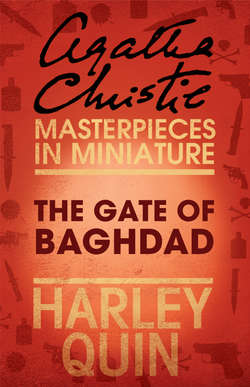Читать книгу The Gate of Baghdad: An Agatha Christie Short Story - Агата Кристи, Agatha Christie, Agatha Christie - Страница 5
ОглавлениеThe Gate of Baghdad
‘The Gate of Baghdad’ was first published as ‘At the Gate of Baghdad’ in Nash’s Pall Mall, June 1933.
‘Four great gates has the city of Damascus …’
Mr Parker Pyne repeated Flecker’s lines softly to himself.
‘Postern of Fate, the Desert Gate, Disaster’s Cavern, Fort of Fear, The Portal of Baghdad am I, the Doorway of Diarbekir.’
He was standing in the streets of Damascus and drawn up outside the Oriental Hotel he saw one of the huge six-wheeled Pullmans that was to transport him and eleven other people across the desert to Baghdad on the morrow.
‘Pass not beneath, O Caravan, or pass not singing. Have you heard That silence where the birds are dead yet something pipeth like a bird? Pass out beneath, O Caravan, Doom’s Caravan, Death’s Caravan!’
Something of a contrast now. Formerly the Gate of Baghdad had been the gate of Death. Four hundred miles of desert to traverse by caravan. Long weary months of travel. Now the ubiquitous petrol-fed monsters did the journey in thirty-six hours.
‘What were you saying, Mr Parker Pyne?’
It was the eager voice of Miss Netta Pryce, youngest and most charming of the tourist race. Though encumbered by a stern aunt with the suspicion of a beard and a thirst for Biblical knowledge, Netta managed to enjoy herself in many frivolous ways of which the elder Miss Pryce might possibly have not approved.
Mr Parker Pyne repeated Flecker’s lines to her.
‘How thrilling,’ said Netta.
Three men in Air Force uniform were standing near and one of them, an admirer of Netta’s, struck in.
‘There are still thrills to be got out of the journey,’ he said. ‘Even nowadays the convoy is occasionally shot up by bandits. Then there’s losing yourself – that happens sometimes. And we are sent out to find you. One fellow was lost for five days in the desert. Luckily he had plenty of water with him. Then there are the bumps. Some bumps! One man was killed. It’s the truth I’m telling you! He was asleep and his head struck the top of the car and it killed him.’
‘In the six-wheeler, Mr O’Rourke?’ demanded the elder Miss Pryce.
‘No – not in the six-wheeler,’ admitted the young man.
‘But we must do some sight-seeing,’ cried Netta.
Her aunt drew out a guide book.
Netta edged away.
‘I know she’ll want me to go to some place where St Paul was lowered out of a window,’ she whispered. ‘And I do so want to see the bazaars.’
O’Rourke responded promptly.
‘Come with me. We’ll start down the Street called Straight –’
They drifted off.
Mr Parker Pyne turned to a quiet man standing beside him, Hensley by name. He belonged to the public works department of Baghdad.
‘Damascus is a little disappointing when one sees it for the first time,’ he said apologetically. ‘A little civilized. Trams and modern houses and shops.’
Hensley nodded. He was a man of few words.
‘Not got – back of beyond – when you think you have,’ he jerked out.
Another man drifted up, a fair young man wearing an old Etonian tie. He had an amiable but slightly vacant face which at the moment looked worried. He and Hensley were in the same department.
‘Hello, Smethurst,’ said his friend. ‘Lost anything?’
Captain Smethurst shook his head. He was a young man of somewhat slow intellect.
‘Just looking round,’ he said vaguely. Then he seemed to rouse himself. ‘Ought to have a beano tonight. What?’
The two friends went off together. Mr Parker Pyne bought a local paper printed in French.
He did not find it very interesting. The local news meant nothing to him and nothing of importance seemed to be going on elsewhere. He found a few paragraphs headed Londres.
The first referred to financial matters. The second dealt with the supposed destination of Mr Samuel Long, the defaulting financier. His defalcations now amounted to the sum of three millions and it was rumoured that he had reached South America.
‘Not too bad for a man just turned thirty,’ said Mr Parker Pyne to himself.
‘I beg your pardon?’
Parker Pyne turned to confront an Italian General who had been on the same boat with him from Brindisi to Beirut.
Mr Parker Pyne explained his remark. The Italian General nodded his head several times.
‘He is a great criminal, that man. Even in Italy we have suffered. He inspired confidence all over the world. He is a man of breeding, too, they say.’
‘Well, he went to Eton and Oxford,’ said Mr Parker Pyne cautiously.
‘Will he be caught, do you think?’
‘Depends on how much of a start he got. He may be still in England. He may be – anywhere.’
‘Here with us?’ the General laughed.
‘Possibly.’ Mr Parker Pyne remained serious. ‘For all you know, General, I may be he.’
The General gave him a startled glance. Then his olive-brown face relaxed into a smile of comprehension.
‘Oh! That is very good – very good indeed. But you –’
His eyes strayed downwards from Mr Parker Pyne’s face.
Mr Parker Pyne interpreted the glance correctly.
‘You mustn’t judge by appearances,’ he said. ‘A little additional – er – embonpoint – is easily managed and has a remarkably ageing effect.’
He added dreamily:
‘Then there is hair dye, of course, and face stain, and even a change of nationality.’
General Poli withdrew doubtfully. He never knew how far the English were serious.
